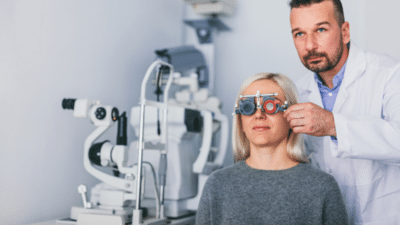
Eye health is surrounded by misconceptions that can delay care or cause unnecessary worry. By understanding the truth behind common myths, we can better protect our vision and make informed decisions. Here are five widespread myths about eye diseases : debunked.
1. Myth: Using kajal or kohl protects the eyes from infections
Many believe that applying kajal keeps the eyes clean and prevents infections. In reality, kajal has no protective effect. In fact, it can sometimes increase the risk of irritation, allergic reactions, or even infection if contaminated. Safe eye health depends on proper hygiene and medical care, not cosmetic products.
2. Myth: Wearing glasses makes your eyesight weaker
A common concern is that relying on glasses will worsen vision over time. In truth, glasses correct refractive errors like nearsightedness or farsightedness but do not alter the eye’s structure. Vision may change naturally with age, but glasses are not the cause. Instead, they help you see clearly and reduce strain.
3. Myth: Only older adults develop eye diseases
While conditions like age-related macular degeneration are more common in seniors, many eye diseases affect younger people too. Glaucoma, diabetic retinopathy, and even cataracts can occur at any age. Children may also face vision problems that require early intervention. Regular eye exams are essential for all age groups.
4. Myth: Eye exercises or “natural remedies” can cure vision problems
Certain programs claim to restore perfect vision through exercises or herbal treatments. Unfortunately, there is no scientific evidence that these methods reverse conditions such as myopia or astigmatism. While healthy lifestyle choices—like balanced nutrition and avoiding smoking—support eye health, they cannot replace medical treatments or corrective lenses.
5. Myth: Cataracts must be “ripe” before surgery
In the past, cataract surgery was delayed until the lens became very opaque. Modern techniques, however, make it possible to operate earlier, when vision begins to interfere with daily activities. Delaying surgery unnecessarily can reduce quality of life and increase risks.
Eye diseases are often misunderstood, leading to myths that can delay proper care. The truth is simple: eye health depends on timely check-ups, early detection, and professional treatment. By letting go of these misconceptions, we can take better steps toward preserving our vision and ensuring lifelong eye health.
(Dr Neeraj Sanduja, MBBS, MS, Ophthalmologist , and Eye Surgeon )
-
Jack Wilshere 'close' to first managerial role after ex-Premier League club sack boss

-
EU makes major threat to UK in Brexit revenge plot - it's a disaster for Starmer

-
Emirates Stadium upgrade imagined by AI as stunning new pictures of Arsenal ground emerge

-
Prince Harry and Meghan Markle to step out for rare joint appearance in less than 48 hours

-
Encounter Breaks Out Between Terrorists & Security Forces In Jammu & Kashmir's Rajouri
